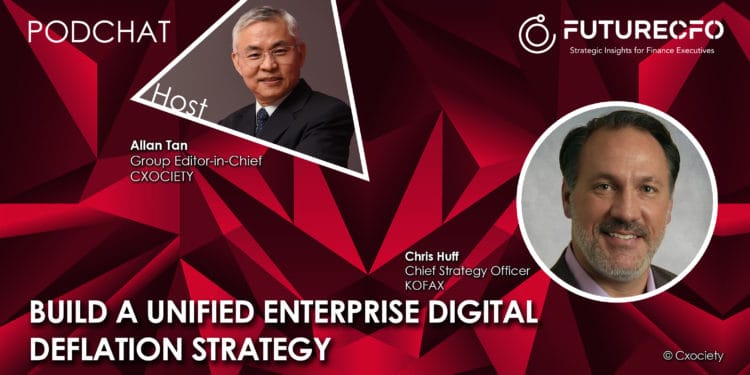The fans of inflation are diverting focus for many CFOs from pursuing innovation and growth strategies to curtailing possible runaway costs as organisations push forward their digital strategies.
In 2021, 60% of organisations were experiencing wage inflation. Since then, mentions of inflation on earnings calls have increased eightfold. There’s little question that inflation will be a big theme in 2022 or that it will present challenges.

“CFOs have little control over inflation itself, but it adds cost pressure that they must navigate their businesses through,” says Alexander Bant, practice vice president of finance at Gartner.
“When faced with challenges that could harm profitability, the instinctive CFO response is to reduce costs near-term or delay spending until inflation subsides.”
Well-planned and implemented digital initiatives must have a long-term deflationary effect on business costs and, subsequently, the price of products or services. Gartner calls this digital deflation – investment in technology to permanently reduce the cost of doing business, said Bant.
Chris Huff, chief strategy officer at Kofax, notes that the increased wage pressures, supply chain costs, and the headwinds have all posed a risk for companies to generate those projected profits and hit revenue targets.
He added that a great enabler for leading industry CFOs to take rapid action is the data they have at their fingertips and respond to these pressures by divesting underperforming assets.
“CFOs are now analysing receivables and payables and tightening up their credit support, the demand around return on investment become greater and there's more scrutiny on internal investment projects. That's critical given the continued uncertainty associated with the pandemic supply chain, increasing interest rates and the Russian war on Ukraine,” he continued.
Do you expect CFOs to recommend scaling back on ESG initiatives, at least in the short term?
Chris Huff: Scrutiny on ESG initiatives is probably called for, but I don't think abandoning ESG is going to be the answer. I point to automation and technology writ large as a tremendous deflationary force because of the enormous increase in productivity, and that it allows the production of goods and services to scale efficiently.

"On the demand side that the CFO plays on, technology reduces the need for labour and puts downward pressure on wages and employment levels, which in turn reduces demands for goods and services. On the supply side, CFOs are viewing technology as a wage that allows the production of goods and services to scale faster than the consumer demand for them."
Chris Huff
I would expect CFOs to align company priorities to focus less on buzzwords like ESG and more on the real impact of digital transformation to keep costs in check while advancing their larger strategic vision for the respective organisation.
How should CFOs and including the finance team plan for these activities to reflect rising inflation and the uncertainties of the time that we started talking about?
Chris Huff: CFOs can now deploy easier-to-use software and their non-technical business analysts can automate many of these business operations across FP&A to budgeting. This is something that the CFO did not have at their disposal as we went through the last few economic downturns.
With the Intelligent Automation platform that Kofax brings to the CFO office, we help the CFO very specifically and they have been elevated now from a transactional office to a strategic advisory office to the business.
A game changer for the CFO is to be able to deliver greater insights from the volumes of data that they own and deliver those insights to the business by better planning core finance operations through strategic input to the critical business investment decisions.
Can finance teams continue their transformation initiatives, while being aware of the pressures to focus on more pressing issues like rising inflation?
Chris Huff: I believe CFOs are extremely resilient and are equipped to focus on what the business needs — everything from increased compliance and governance and more auditable automation solutions to taking a cloud-first Software as a Service cloud-first approach.
CFO now have at their disposal, more industry, vertical, automation solutions than before — buying into ecosystems, not individual point automation solutions.
Customers are no longer looking at individual vendors, but strategic partners that can bring the power of an ecosystem to deal with the challenges of today and the unknowns of tomorrow.
Do you ever see a future where the finance team won't be so dependent on the use of these spreadsheets as opposed to taking advantage of new technologies that organisations like Kofax bring to bear?
Chris Huff: There's always the evolution of technology where you improve the experience while lowering the total cost of ownership by converging various technologies and ingesting them into common business operations. Before Microsoft Excel, finance people were having to add, subtract, divide, multiply, and now they just use that function within Excel.
Gartner says that 95% of workloads are going to be executed on the cloud, which means less moving data around and more automation, augmenting people not replacing them and freeing them up from the menial tasks.
What is your recommendation for CFOs to help them balance the need to innovate, meet customer expectations, and deliver shareholder value in the face of rising inflation?
Chris Huff: Executive sponsorship is the first thing I would focus on — strategic outcomes, not technology. The next one is I would start to converge strategy and execution.
The missteps are the miscommunication between strategy and execution and your top executives within the finance office need to be able to design strategy and drive execution.
The third piece is around strong governance with a strong focus on priorities and creating those underlying cross-domain functional teams that can drive that execution and drive alignment across the business.
Click on the PodChat player and hear Huff share his perspectives on how to build a unified enterprise digital deflation strategy.
- Inflation is rising in many economies in Asia. At the same time, we are still in the middle of uncertainty with COVID impacting revenue and growth of businesses. How are CFOs responding to the two trends?
- Digital transformation, including finance digitalization, is a forward-looking initiative that costs money and resources. Similar, ESG is a new buzzword but it will cost companies money they might not afford in the near term. Do you expect CFOs to recommend scaling back on these initiatives?
- How should CFOs, and the finance team, plan table stake finance activities like FP&A, budgeting, cash management, investments, M&A, etc to reflect rising inflation and the uncertainties of the time?
- Finance transformation has been on the plan for some time now. Can finance teams continue their transformation while being cognizant of pressures to focus on more pressing issues like rising inflation?
- What is your recommendation for CFOs to help them balance the need to innovate, meet customer expectations, deliver shareholder value in the face of rising inflation?




